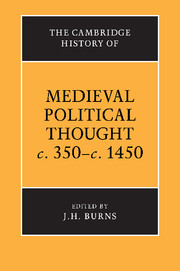Book contents
3 - Roman law
from I - Foundations
Published online by Cambridge University Press: 28 March 2008
Summary
Knowledge of Roman law was transmitted to later ages through two main bodies of material, first the so-called barbarian codes, collections of materials made by Gothic and Burgundian kings at the beginning of the sixth century for application to their Roman subjects, and secondly, the Corpus luris of the Emperor Justinian, enacted in the 530s. Very few texts survived except by incorporation in these collections, and they did not become known until the sixteenth century or later. The legal material in the sixth-century collections is the product of a thousand years of legal development, and is in various forms, partly legislation and partly discussion by legal experts. It is concerned with private law, governing the relations between private individuals, rather than public law, governing the organs of the state, which was relatively undeveloped until the Byzantine period.
Technically Roman law reached its peak in the first two centuries AD, known as the classical period, but the seeds of the classical law can already be discerned in the tribal law of the small city state of the fifth century BC. On the establishment of the Republic in 509 BC, the law was a set of unwritten customary rules regarded as part of the way of life of the Roman people. Its application was confined to Roman citizens (ius civile, law for cives, citizens). In matters of doubt, the interpretation of the pontiffs, a body of patrician aristocrats, was decisive both as to the law and to the ritual forms for enforcing it.
- Type
- Chapter
- Information
- Publisher: Cambridge University PressPrint publication year: 1988
References
- 4
- Cited by



